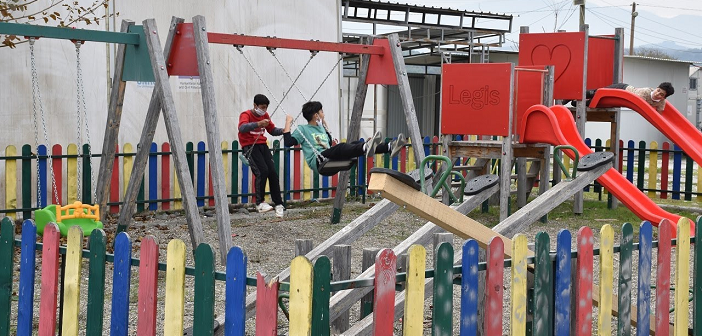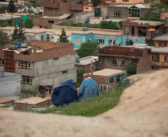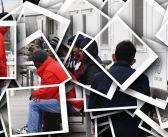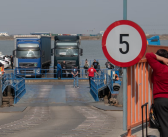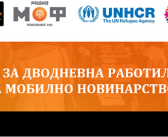-
На повикот за есеј на тема поврзана со мигрантите, бегалците, лицата баратели на азил или лицата без државјанство, организиран од МОФ и Радио МОФ пристигнаа голем број квалитетно напишани есеи од млади луѓе. И покрај тоа што беше посочено дека ќе биде објавен најдобриот есеј, односно оној кој освоил прво место, сепак, поради квалитетот на останатите два решивме да ги објавиме сите три есеи.
Есеите се објавени интегрално на јазикот на кој се испратени на повикот.
Повикот имаше цел да ја подигне едукацијата на јавноста за мигрантите, бегалците, барателите на азил и лицата без државјанство.
STATELESSNESS, AN UNLUCKY HAND (EASILY) DEALT.
Affecting over half-a-million people in Europe alone, statelessness is a scourge that denies its victims fundamental rights that we take for granted, such as access to education, healthcare, and even freedom of movement. These are people – aliens who are not considered nationals under the laws of any state (UNHCR, n.d.). While sovereign states have agreed to collaborate (together with international and intergovernmental organizations) to tackle this plague, many of them lack holistic national frameworks and hence fail to meet their international legal commitments to combat statelessness (European Network on Statelessness, n.d.). These insufficiencies of a legal framework, together with the redrawing of borders in the last decade of the twentieth century are two of the most pertinent factors contributing to statelessness around the world today.
The legal construct of nationality, i.e., being recognized as a subject-citizen of a sovereign state, lies at the centre of this issue. People often acquire a nationality at birth, either through their parents or through the country in which they were born. However, in other cases, a person must apply to become a citizen of a country. Assume the persona of Todi, a 10-year- old of unknown parentage living in a country where nationality is obtained through descent from a national. Todi will be ruled stateless since s/he cannot prove his/her heritage and hence will not meet the legal requirements of that state to get citizenship while living under these predetermined conditions. States have made significant efforts to offset this by recognizing people like Todi as citizens of the country in which they are found. However, this is only the first step in a long series of actions needed. For instance, if a child is born in a country other than the country of origin of its parents, the child may become stateless if that country does not allow nationality based solely on birth and the country of origin does not enable a parent to pass on nationality through familial ties (UNHCR, n.d.). Even now, there are examples of states with such restrictions on granting citizenship. And, even if we suppose Todi has grown up and obtained citizenship in a specific country; if the borders of that country alter for any reason, Todi may no longer be a legal citizen. This was evident in practice during Yugoslavia’s dissolution, when many people were left stateless as a result of ethnic, racial, and religious variables associated with change in borders. Some of these people are still stateless nearly thirty years later, living in excruciating conditions while being denied their most fundamental inherent human rights. Such negligence on the part of states may lead to death, as was the case with T.S. from North Macedonia. This is untenable for a society yearning for EU accession.
Citizenship describes the subject’s (citizen’s) relationship and interdependence with the state. As a result of this relationship, certain rights and duties emerge. While it is each citizen’s responsibility to follow a country’s laws and regulations, it is the state’s responsibility to serve and protect its citizens. The government of a sovereign state can do this by establishing the absolute rule of law and fostering the respect and advancement of human rights. The most essential element of the Universal Declaration of Human Rights for the purposes of this document is Article 15, which declares unequivocally that “everyone has the right to a nationality” and that “no one shall be arbitrarily denied his nationality.” Despite the fact that ratifying this declaration is a prerequisite for countries’ admission to the United Nations, people all across the world face the risk of living without the rights and security that come with legal citizenship. Disrespect for the former of these rights is the first domino to fall, leading to further denial of other human rights. Returning to the Todi analogy, Todi, like all of his/her peers, wishes to enrol in university, but when s/he arrives at the admissions office, s/he is informed that s/he does not possess all required documentation, specifically evidence of citizenship. S/he is denied the right to an education. Todi, devastated that s/he will not be able to reach his/her full potential by attending college, believes that the best option for him/her is to just obtain a job. However, s/he is subjected to another violation of his/her rights: none of the employers are willing to hire him/her because they are unable to do so legally since, in the eyes of the state, s/he does not exist. This compels Todi to work on the black market, which is often dangerous and prone to legal repercussions. A month into his/her hectic new black-market employment, s/he becomes ill. So, naturally, s/he goes to the doctor. Todi is then informed that s/he lacks health insurance due to his/her statelessness and hence cannot afford healthcare, denying him/her access to healthcare, yet another fundamental human right. Todi decides to relocate to another country in search of a better life, hoping that it will be more capable of granting and protecting his/her most basic human rights. At the border Todi is told that s/he cannot cross because s/he lacks valid identification and travel documents. S/he is currently being denied his/her freedom of movement. So, in addition to denying Todi’s access to education, healthcare, and the labour market, his/her home country is now preventing him/her from leaving. As a result, many stateless people are forced to smuggle across borders since they have no other option.
While Todi is a fictional character in this essay, s/he symbolizes hundreds of thousands of individuals around the world who are suffering. Every day, young children, boys and girls, adolescents and elders pay the price for inadequate legal frameworks by being regarded as invisible by countries, denied the freedoms they watch others enjoy while they cannot. It is critical to recognize that cases like Todi’s are universally feasible, especially in these uncertain times when we are all just one step away from being another Todi.
References:
European Network on Statelessness. (n.d.). Statelessness in Europe. Retrieved May 30, 2022. https://www.statelessness.eu/issues
United Nations High Commissioner for Refugees. (n.d.). Ending statelessness. Retrieved May 30, 2022. https://www.unhcr.org/ending-statelessness.html
Автор: Исак Мисини
Оваа активност е финансирана со средства на Миграцискиот повеќепартнерски доверителски фонд, во заедничкиот проект имплементиран од Агенцијата на ОН за бегалци, УНХЦР и партнерските агенции на ОН. Содржината создадена во рамките на активноста не нужно ги отсликува ставовите на Фондот, УНХЦР и партнерските организации на ОН.
-
„Во кожата на еден бегалец“
Бегалец = човек, член на родот хомо сапиенс, маж, жена, дете а пред сѐ личност, но не состојба која го отсликува човекот во дадена ситуација. Една од најтешките работи е да се ставиме во кожата на другиот, да ги почувствуваме неговите емоции, да ги разбереме и да влеземе во неговиот свет, а овој пат да се ставиме во кожата на еден бегалец кој не е ништо помалку од човек кој има желба за подобро утре. Да се запрашаме како ние би се чувствувале кога би имале пет минути да го спакуваме куферот и да избегаме од нашата сопствена земја? Што би спакувале најпрво?
Животот е патување, а за овие луѓе патување со милиони километри, но не со авион во „прва класа” на некоја егзотична дестинација, туку патувања со чамци, бродови, преку шуми, реки, мориња, езера и океани со многу „турбуленции”, гладување и неспиени денови. Патуваат од појдовна точка А до локација која што е непозната и променлива во секое време, под различни временски промени и не по своја желба, туку поради оправдан страв дека ќе бидат прогонувани заради својата раса, вера, националност, припадност на одредена социјална група или поради своето политичко уверување. Бегалците се насилно раселени. Ова значи дека немале друг избор освен да заминат, во спротивно тие би продолжиле да бидат изложени на опасност. Нивните места во авионот не се секогаш еден до друг до прозорецот, туку во превозни средства каде што едвај гледаат каде се движат, а можеби и никогаш повторно нема да бидат заедно. Замислете дека денес, вие и вашето семејство појадувате заедно на трпезата, а утре добивате лимитирана храна и вода за која можеби и нема да ја добиете со денови…Милиони луѓе се приморани да бегаат, изложени на кражби, трговија со луѓе, плаќајќи ја цената на војните, на конфликтите, на неуспехот на дипломатијата, на недостатокот на волја на земјите да соработуваат едни со други, на политичката злоупотреба на бегалците и барателите на азил. Според новите податоци на УНХЦР бројот на присилно раселени луѓе ширум светот се искачил на 90 милиони до крајот на 2021 година, распламтен од новите бранови насилство или долготрајните конфликти во државите вклучувајќи ги Етиопија, Буркина Фасо, Мјанмар, Нигерија, Авганистан и Демократската Република Конго. Покрај тоа, од УНХЦР додаваат дека војната во Украина раселила 8 милиони луѓе во рамките на земјата оваа година, а регистрирани се повеќе од 6 милиони бегалски движења од Украина кон надвор. Позади овие милиони бегалци стојат распаднати семејства, кариери, планови, визии. Меѓународното право вели дека бегалците не можат да бидат испратени назад во нивната земја ако тоа ги стави изложени на ризик од војна, насилство или прогон. Тие имаат право да останат во земјата домаќин, имаат право на здравствена заштита, на образование, имаат право да изнајмат или да стекнат место за живеење, а имаат и други основни права како што се слобода на изразување и религија.
Одговорот на прашањето што би спакувале најпрво во нашиот куфер доколку сме приморани да избегаме од нашата држава е надеж. Да си подадеме рака и да зборуваме гласно за правата на бегалците, да им дадеме право на глас и да не го прескокнуваме нивното учество во заедницата. Да зборуваме за бегалските кризи и да ги срушиме стереотипите за бегалците. Да се соживееме со приказните бидејќи вечерва ќе заспиеме на нашиот удобен кревет со мирен сон, а следниот ден некаде далеку од нашата соба која што ќе биде замена во шелтер полн со странци, каде што ќе имаме само една желба а тоа е да се разбудиме со некаква промена за подобро утре. Да ги прифатиме и да им дадеме шанса за напредок во своите цели. Светлиот пат можеме да им го покажеме сите ние бидејќи за нас животот тече а за нив ќе стои доколку не покажеме хуманост! Бегалец сега, човек засекогаш!
Користена литература:
https://www.youtube.com/watch?v=25bwiSikRsI
https://www.youtube.com/watch?v=KFMc45CUixc
https://www.youtube.com/watch?v=J6OykA0UAJo
https://www.unhcr.org/618bc1d64
Автор: Лела Радуловиќ
-
For the silent voices of the world
Our world is a place with abundant immorality. It is home to great pain and suffering. Suffering of the innocent and pure. Suffering at the hands of our own; mankind. It is home of stifled courage and smothered hope. Extinguished desires and dreams of freedom. There exist countless silenced voices and many untold stories. Silent voices which are our duty to echo. Untold stories which are our duty to tell. Tales and cries of the women who endure the worst of humanity.
Born a woman; born a possession. This is the reality many in the world have no choice but to face. They are imprisoned in a loop of unceasing struggle. A cell in a vicious cycle of agony. Their life does not belong to them to lead. Their own body is not theirs to command. They perpetually belong to someone else; owned by the very people whose responsibility is to protect them. Seen as objects that can be bought and sold; mere property that can be retained and ruled. Perceived as shells without emotions and inclinations. Their human worth is erased. They have no value outside of their role. There is no one who hears their cries. No one that can shield them from their captor’s torture. Their voice is taken and their freedom is forever seized. They are encaged by the claws of tradition; in a prison they cannot escape alive. Sentenced for the crime of being a woman. Killed for the curse of being a woman.
What gives one’s right to take another’s life? Honor, they will say. To break one’s honor is the single worst crime one can commit. To bring one shame is justification to take one’s life. They will say honor killing is the way of bringing back purity, yet those who they are killing are the only purity left in the world. Dimming the last sparks of light in a black gloom. For these women to go against the word of men is a demise. To refuse a marriage they did not choose – or just the trade to a new captor is a death sentence. If they seek help they bring shame. If they try to break free they are murdered, for they mustn’t bring humiliation to their community. If they fight for their freedom they are killed. Loving in all sincerity, someone who is not allowed is punished. Disciplined for trifling rumors and false sayings. Speaking out is bringing dishonor. Even being maltreated by another is seen as losing the little worth they have. So, they are killed. Life taken for being a victim. These women live in a world where honor is set above all morality and principles; it is given more of an importance than human life itself. It is a threatening and mighty thing. Yet honor does not kill. Men do.
So many lives lost. Too many dreams put to an end. So much hope suffocated. Many things grasped from children; youth and all its purity. Girls who will never know of dressing how they like. Of daring to love who they wish. Never knowing of having an own voice or say. Not living in a way other than being controlled like a soulless puppet. Their potential is robbed. Countless aspirations snatched from their hearts. For many, the wish of education is something they must let go. For some it’s easier to not let themselves dream of a free tomorrow; a yearning for something unreachable. Because they know they will never be truly free. Even if they make it out they will be traced and hunted. Pursued by a storm they cannot escape. Wherever they go, whatever they do, they will never live completely untied. They are damned by a life they did not choose; life in hiding and fear. A life that many decide is not worth living.
There must be hope. We must be their hope. As human beings, each and every one of us has the moral duty of helping humanity. We all hold a stone that contributes to building a better world. We have the duty to hear the silenced voices of the world. We have the obligation to spread their word. Spread their pain. Spread their suffering. Every human has a worth; we must not forget that. We shouldn’t let the tortured souls of the world be forgotten. We must help them; take them and protect them. Because every human deserves life. We need to give them one they never had. It is the least we can do. If we lose hope in humanity then we are lost. If we stay in oblivion for all the torment in the world then we have lost. If we stay silent about all the oppression and mistreatment on our globe then we shouldn’t call ourselves human. That is not what being human is about. We need to find and awake the humanity in every single one of us. We should let our compassion and benevolence bloom. Sympathy is the most divine ability we have, so let’s embrace it in all its power. Let’s make the change we want to see. Because our voice is more significant and influential than we believe.
The world has far too much injustice and torture in it. The vile can take so much from their victims. They can take their voice, rights and freedom. But they cannot corrupt their soul. One thing they can never take is their virtue. Their innocence. And we have to welcome that good; foster those gems. We are the builders of a better tomorrow. The world can be saved by a smile of a free child.
Автор: Славчо Велкоски


